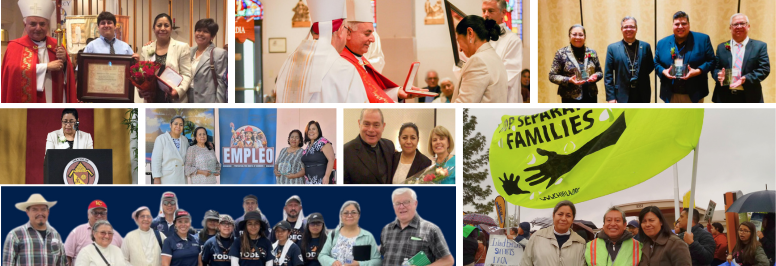By Elena Macias
“I was actually invited to collaborate in a transition, and 23 years have passed,” said Petra Alexander, reflecting on her time spent as the Director of the Diocesan Office of Hispanic Affairs.
Alexander has spent the last 23 years dedicating herself fully to her ministry, forming countless relationships, walking side-by-side with immigrant and migrant communities, sharing various cultures, and now, she is ready for her next journey of retirement.
If your parish has a prominent Hispanic ministry, it’s very likely that Alexander has been there to offer help, knowledge or resources. She was invited into the Hispanic Affairs Ministry in 2003 by Bishop Gerald Barnes to temporarily support the office.
“The Diocese was newly formed with the Diocesan Vision ‘Impact,’ and during this time, it was clear to me that my task was to share with the Hispanic community the values and purposes of filling lives with hope,” Alexander said. “Taking on these tasks gradually became a reality. We invited Latinos to come for training and to participate in both pastoral and social life.”
Alexander remembers that it was a difficult time for Latino communities. Safe environment regulations were being implemented, the Ministry Formation Institute was unfolding, and the number of immigrants arriving increased - but she went straight to work.
“I learned about the Hispanic Ministry of Region XI (dioceses of Hawaii, California and Nevada), and became involved in regional work, such as the first Youth Ministry Encuentro,” Alexander said. “Later, I was asked to serve on the executive committee for two terms, and later, I was asked to be part of the National Catholic Council for Hispanic Ministry for two more terms. I was fortunate to experience the Fifth Encuentro process as an exhaustive consultation experience at its various levels.”
Over the next two decades, Alexander worked tirelessly day in and day out, through all the challenges and achievements, to serve the various Hispanic communities within the diocese.
“The Hispanic Office connects with a wide diversity, due to its origins, generations, traditions, and tendencies. It is and will always be a challenging spectrum,” Alexander said. “The large number of Latino immigrants places us in front of the migration landscape, but it also connects us with the gifts they bring.”
Alexander is a true living witness of the many gifts the Hispanic community brings and is grateful for those she has worked with to help share these gifts with others.
“I have seen the services that Latinos provide in parishes in various ministerial areas multiply; I have seen the participation and service lists fill with names and surnames,” Alexander said. “We have opened channels for the various apostolic movements and groups to express their rich traditions and devotions. I am grateful for all the agencies and individuals with whom we have interacted and the support we have received to inform and assist. I have been fortunate to collaborate with other Catholic agencies, such as El Sembrador Nueva Evangelización (ESNE), Catholic Extension, and others, but also with our local agencies, some of which we have seen emerge and grow.”
During her time in ministry, Alexander received many distinguished honors for her work. On Aug. 28, 2013, she received the Outstanding Diocesan Director of Hispanic Ministry at the Annual Convention of the National Catholic Association of Diocesan Directors of Hispanic Ministry. On May 23, 2016, Alexander was bestowed the Pro Ecclesia Et Pontifice Cross, the highest honor given to a layperson in the Roman Catholic Church and awarded by the Pope. Alexander also published a book in Spanish entitled, “365 Days Accompanied by the Saints,” which reflects her experience of the Saints as a lifelong Catholic in Hispanic culture. She was honored in the category of Hispanic Ministry and Spiritual Formation Leadership at the National Catholic Association of Diocesan Directors for Hispanic Ministry (NCADDHM) Conference in November of 2022. In addition, she hosted her own weekly radio show on El Sembrador, called Sowing Hope.
Through the years, Alexander has built relationships with various communities in the diocese who emigrated from Mexico, Central and South America, and has enthusiastically celebrated and shared their special traditions and devotions.
“I have witnessed the flourishing of spiritualities,” Alexander said. “The roots our communities have, such as the love for Our Lady of Guadalupe; the devotion to the Black Christ of Esquipulas for Guatemalans, the Immaculate Conception for Nicaraguans, and the Divine Savior of the World for Salvadorans. All of this leads communities to a closeness to Christ, to a love of the Eucharist, to unite His praise with service. I also hold a special affection for our communities of indigenous peoples, the Purépecha and Mayan people of Guatemala.”
Through all her work with these communities, Alexander realizes the importance of continuing to accompany them.
“Statistics constantly challenge us. The presence of immigrants, births, the growth of families, the rise of Spanish as a living and active language. The Hispanic community in a diocese like ours will need relationships, alliances, and accompaniment.”
For the next person who takes leadership of the Diocesan Office of Hispanic Affairs, Alexander offers her advice.
“I think I would repeat the advice of Joshua: “Be courageous and firm to lead this people and to keep the commandments of the Lord. Do not be afraid or dismayed, for the Lord will be with you wherever you go…” (Joshua 1:6-9) The guidelines of our Pastors are clear; we have many insights derived from the V Encuentro. It is up to us to walk with this great community in constant synodal listening, with pastoral prudence. We are going through a difficult time socially and ecclesially, which is undoubtedly also God’s time.”
Elena Macias is the Managing Editor of the Inland Catholic BYTE and El Compás Católico.


